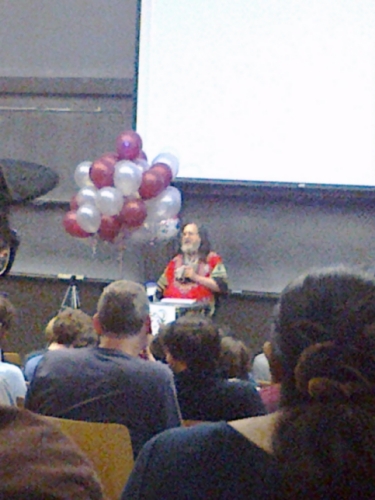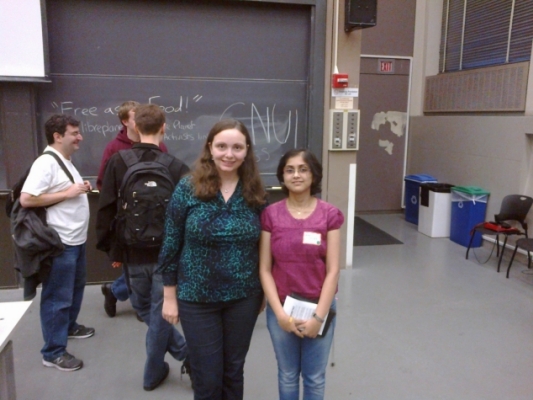GNU Conference
The best way to spend time is to do the things that you love. And last weekend of September was spent doing exactly that. I had the opportunity to attend the GNU 30th anniversary conference which was being organised at Massachusetts Institute of Technology. Well, when you know that Richard Stallman would be giving a talk at the conference, can you control your excitement? It was a pleasure to meet all the people about whom you had just read in news articles. It is overwhelming to meet the people you had been admiring ever since you had stepped into FOSS.
The Conference
The conference was nothing less than amazing.
It started with the welcome address from John Sullivan who explained why Free and Open Source Software is of ever increased importance. Most people have very little idea of how much personal data they have put up online and how many of the places which they have trusted with their data are actually providing backdoor to the government or other agencies. A lot of action with our data is taken without our consent. We are constantly being forced to use some particular software and are being denied the freedom to install other software on our own machines (you know what I am talking about). The various projects of GNU and other organisations were introduced.
Well, no open source conference is complete without a hackathon. The aim of the hackathon was to introduce their projects to each other and the new-comers. I must admit that I was one of the few new-comers. The hackathon had the following projects:
- coreboot
- GNU Octave
- GNU FM
- GNU social
- GNOME
- Gnash
- GNU mediagoblin
- Tor
- Tahoe-LAFS
- Commotion
- Guix
The hackathon started off quite good with a few hours being spent at helping people setup the project on their laptops. The conference also had a cryptoparty where they were helping people get started with GnuPG, an open and complete implementation of OpenPGP standard as defined by RFC4880. It was fun to get to know more about cryptography and why people are actually using it. The Tor people were going around the various projects trying to figure out any security vulnerabilities these projects may have. It turned out that almost all the projects had some issues which wouldn’t be visible until someone devoted a lot of time figuring it out. Well, that is what crackers would do. So, the conference just made FOSS much more safe.
I got started with GNU FM development during the hackathon. Turns out that it would be a nice alternative to last.fm in some time.
Let us come to what Richard Stallman talked about during his address at GNU 30. It was a pleasure to listen
to his experience about bringing up GNU which revolutionised the way FOSS was perceived. Richard was quite
instrumental in demonstrating to the big companies that most open source software are much more economical
for them instead of what we all prefer to call, bloated proprietary software difficult to customise according
to our own needs. We owe a lot of our progress in science and technology to FOSS. It is very important for
us to realise why software which restricts our freedom is detrimental to our progress, because progress and
freedom are very closely related to each other. Every single thing that is taken without our content can be
used against us. We should not be tracked without our consent. But this is happening every single moment.
Richard emphasized on the need to raise more money for FOSS because like everyone in the world people working
in FOSS also need money to improve their products. Unfortunately, not many people are willing to donate to
FOSS which is hampering the development. When you have people with a lot of money competing with you, you
also need a bit of money apart from your good work.

It is difficult to say which part of the conference was the best. I had a chat with several core developers of the various projects participating in the conference. Their approachability is absolutely brilliant. Several of them expressed interest in helping the Linux User Group in fulfilling its aim - promotion of FOSS on campus. The most overwhelming of all chats was the one with Nick Mathewson, one of the three original developers of Tor. It was extremely humbling to meet someone who knows so much about the web, its shortcomings, advantages, vulnerabilty. These people could have used their knowledge to exploit the common users without our knowledge and could have earned huge sums of money from the exploitation but well, they are acting as our protectors.
How I got there?
Well, travel to a foreign soil is usually expensive business. Free Software Foundation had awarded me a
travel scholarship, taking care of most of my travel cost. And the credit for this goes to Marina,
the coordinator of GNOME’s Outreach Program for Women. She had invited the women participants of GSoC
interns in the organizations that were also running Outreach Program for Women in parallel with GSoC.

To be honest, there is no greater joy than being invited to such a great conference, being awarded a travel scholarship for the same and then meeting exceptional people. I would like to thank SDSLabs for leading me to this point.
